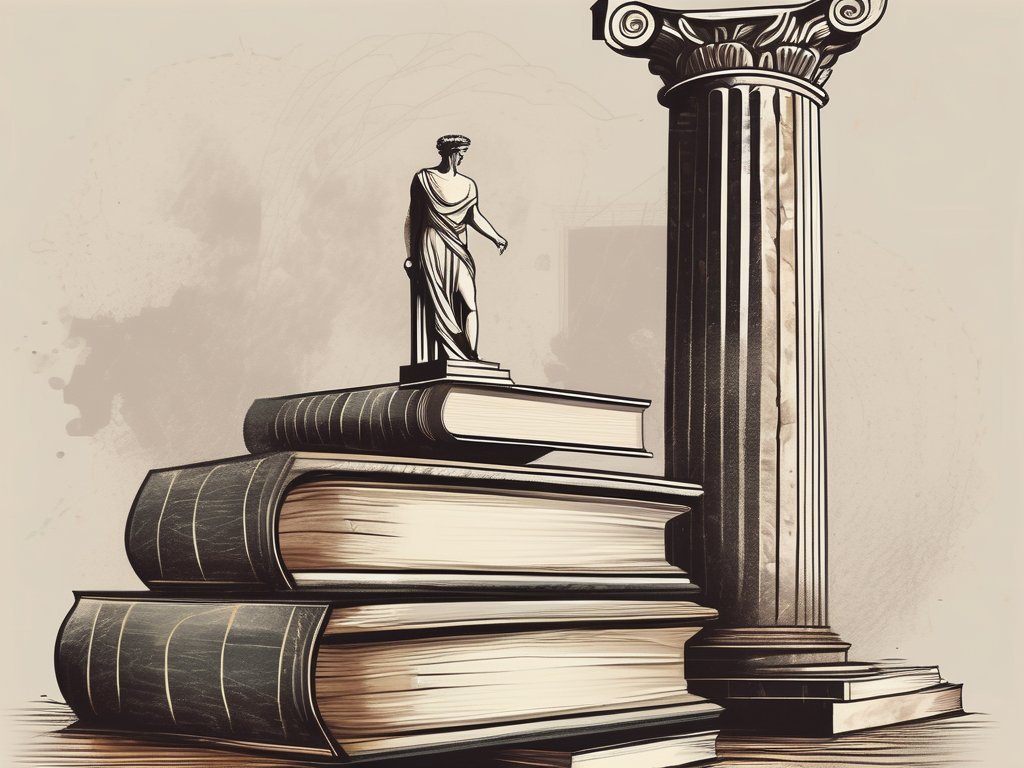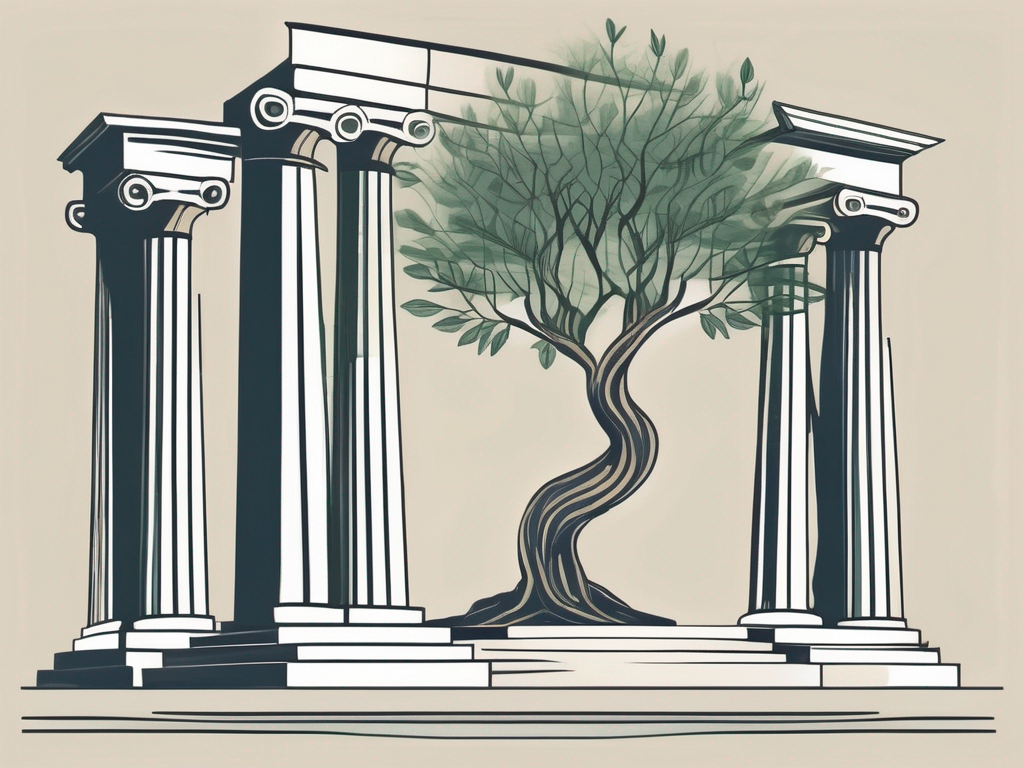Stoicism, a school of philosophy that originated in Ancient Greece, has had a lasting impact on the world of philosophy. At the forefront of this influential movement was Chrysippus, a philosopher who played a pivotal role in the development and dissemination of Stoic teachings. In this comprehensive exploration, we will delve into the life, teachings, and controversies surrounding Chrysippus, shedding light on his enduring legacy.
Understanding Stoicism: A Brief Overview
Before we dive into Chrysippus’ contributions, let’s gain a brief understanding of Stoicism itself. Stoicism is a philosophical school that originated in ancient Greece and was later embraced by the Romans. It emphasizes the importance of living in accordance with nature, focusing on virtue, reason, and self-control. The Stoics believed that by aligning oneself with the natural order of the universe, one could find tranquility and peace amidst the challenges and uncertainties of life.
The fundamental principles of Stoicism, which form the bedrock of Chrysippus’ teachings, are essential to grasp the essence of this philosophical school. These principles provide a framework for understanding the Stoic worldview and serve as a guide for living a virtuous and fulfilling life.
The Fundamental Principles of Stoicism
Stoicism revolves around three key principles: logic, physics, and ethics. Logic, also known as dialectic, entails understanding and reasoning. It serves as a guide to achieving wisdom and developing critical thinking skills. The Stoics believed that by engaging in logical analysis and questioning our own beliefs, we can gain a deeper understanding of the world and ourselves.
Physics explores the nature of the cosmos and our place within it. The Stoics believed in a rational and orderly universe governed by divine reason, which they referred to as the Logos. They saw everything in the universe as interconnected and interdependent, emphasizing the unity of all things. This cosmic perspective allowed the Stoics to cultivate a sense of awe and gratitude for the natural world.
Ethics delves into the realm of virtue and moral living. The Stoics believed that the ultimate goal of life is to live in accordance with nature and to cultivate wisdom, justice, courage, and temperance. They emphasized the importance of personal responsibility and the power of choice. According to the Stoics, true freedom lies in our ability to choose how we respond to external events, rather than being enslaved by our desires and emotions.
Stoicism’s Influence on Modern Philosophy
The impact of Stoicism extends far beyond ancient times. Stoic principles have had a profound influence on modern philosophy and continue to shape our understanding of the world and our place in it. Many prominent philosophers have been inspired by Stoic teachings and incorporated them into their own work.
Immanuel Kant, one of the most influential figures in Western philosophy, drew upon Stoic ethics in his moral philosophy. Kant emphasized the importance of moral duty and the pursuit of the highest good, echoing the Stoic emphasis on virtue and moral living.
Friedrich Nietzsche, the renowned German philosopher, was deeply influenced by Stoic ideas. Nietzsche admired the Stoic emphasis on personal responsibility and the cultivation of inner strength. He believed that embracing challenges and overcoming adversity were essential for personal growth and self-realization.
The existentialist movement, which emerged in the 19th and 20th centuries, was also influenced by Stoic principles. Existentialist thinkers such as Jean-Paul Sartre and Albert Camus explored themes of individual freedom, authenticity, and the search for meaning in a seemingly absurd world. These themes resonate with Stoic ideas of personal responsibility, resilience, and the pursuit of virtue.
In conclusion, Stoicism offers a timeless philosophy that continues to inspire and guide individuals in their quest for a meaningful and fulfilling life. By understanding the fundamental principles of Stoicism and its influence on modern philosophy, we can gain valuable insights into how to navigate the complexities of existence and find tranquility amidst the challenges of life.
The Life and Times of Chrysippus
Now that we have a foundation in Stoicism, let’s turn our attention to the life and achievements of Chrysippus, who played a crucial role in furthering this philosophical tradition.
Early Life and Education
Little is known about Chrysippus’ early life, but it is believed that he was born in Soli, Cilicia, around 280 BCE. Soli, a city located in modern-day Turkey, was known for its rich cultural and intellectual heritage. Growing up in this vibrant city, Chrysippus was exposed to a diverse range of ideas and philosophies from an early age.
Chrysippus’ thirst for knowledge led him to pursue a rigorous education. He studied under some of the most renowned philosophers of his time, immersing himself in the teachings of the Stoic school of thought. This rigorous intellectual training shaped his thinking and laid the foundation for his future contributions to Stoicism.
Chrysippus’ Contributions to Stoicism
Chrysippus is celebrated for his extensive writings, unparalleled reasoning abilities, and the development of Stoic philosophy. His work encompasses a wide range of subjects, including logic, ethics, physics, and theology. Chrysippus’ comprehensive systematization of Stoic teachings helped solidify its foundations and spread its influence throughout the ancient world.
One of Chrysippus’ notable contributions to Stoicism was his development of propositional logic, a branch of philosophy that deals with the study of logical relationships between propositions. His logical system, known as Stoic logic, provided a framework for analyzing and evaluating arguments, laying the groundwork for future advancements in the field of logic.
In addition to his work in logic, Chrysippus made significant contributions to Stoic ethics. He emphasized the importance of living in accordance with nature and cultivating virtue as the key to human flourishing. Chrysippus’ ethical teachings resonated with many, offering practical guidance on how to navigate the challenges of life and find inner tranquility.
Chrysippus’ influence extended beyond philosophy. He was known for his profound insights into the workings of the natural world, contributing to the field of Stoic physics. His theories on determinism and the interplay between fate and free will sparked debates and discussions among scholars of his time.
Throughout his life, Chrysippus engaged in spirited debates with fellow philosophers, refining and expanding Stoic philosophy. His writings, unfortunately, have not survived the test of time. However, his ideas and teachings were passed down through the works of later Stoic philosophers, ensuring his enduring legacy.
Chrysippus’ Philosophical Teachings
Chrysippus’ philosophical teachings span various domains, highlighting his intellectual versatility and the depth of his understanding.
Chrysippus, a prominent Stoic philosopher of ancient Greece, left an indelible mark on the fields of logic, epistemology, ethics, and virtue. His profound insights and meticulous analysis continue to shape philosophical discourse to this day.
Logic and Epistemology
Chrysippus made significant contributions to the field of logic and epistemology, playing a pivotal role in the development of formal logic. His meticulous logical analysis allowed him to formulate complex arguments and counterarguments, enhancing Stoicism’s intellectual rigor and persuasiveness.
Delving into the intricacies of logical reasoning, Chrysippus developed a system of propositional logic that laid the foundation for future advancements in the field. His work on syllogistic reasoning, which involves deducing conclusions from premises, established a framework for logical discourse that continues to be studied and refined by logicians today.
Furthermore, Chrysippus explored the nature of knowledge and the limits of human understanding. He delved into questions of perception, memory, and belief, seeking to unravel the complexities of human cognition. His insights into epistemology provided a solid framework for understanding how we acquire knowledge and justified beliefs.
Ethics and Virtue
Ethics held a central place in Chrysippus’ teachings. He emphasized the cultivation of virtue and the importance of leading a virtuous life. Central to this ideal were the cardinal virtues of wisdom, justice, courage, and temperance. Chrysippus believed that the path to eudaimonia, or flourishing, lies in upholding these virtues and living in accordance with nature.
Chrysippus’ ethical teachings went beyond theoretical discussions; he provided practical guidance on how to live a virtuous life. He emphasized the importance of self-examination and self-discipline, encouraging individuals to constantly reflect on their actions and strive for moral excellence.
Moreover, Chrysippus explored the concept of moral responsibility, arguing that individuals have control over their own actions and choices. He believed that by cultivating virtue and exercising reason, individuals can shape their character and lead a life aligned with moral principles.
Chrysippus’ teachings on ethics and virtue continue to inspire individuals seeking to lead a meaningful and virtuous life. His emphasis on personal responsibility and the pursuit of wisdom resonates with those who strive to make ethical choices and contribute positively to society.
The Impact of Chrysippus on Stoicism
Chrysippus’ contributions to Stoicism extend beyond his philosophical teachings, leaving an indelible mark on the development of this school of thought.
Chrysippus’ Role in the Development of Stoicism
Chrysippus’ intellectual prowess and systematic approach helped shape Stoicism into a comprehensive philosophical framework. His logical and ethical insights provided a solid foundation on which future Stoic philosophers built, cementing Stoicism’s place in the annals of philosophy.
The Legacy of Chrysippus in Stoic Philosophy
Chrysippus’ influence on Stoic philosophy is immeasurable. His writings, though largely lost to history, shaped the direction of Stoic thought for centuries to come. Even in the face of adversities, his works continue to inspire individuals seeking guidance in navigating life’s challenges and finding meaning in a complex world.
Criticisms and Controversies Surrounding Chrysippus’ Teachings
As with any philosophical school, Chrysippus’ teachings were not without criticisms and controversies.
Debates and Disagreements in Ancient Philosophy
Ancient philosophers engaged in lively debates and intellectual disagreements, and Chrysippus was no exception. His ideas were subject to scrutiny, with rival schools offering counterarguments and challenging his assertions. These debates fueled intellectual growth and pushed philosophical thought forward.
Modern Interpretations and Critiques
Even in the modern era, scholars continue to interpret and critique Chrysippus’ teachings. As new perspectives emerge, the legacy of this enigmatic philosopher invites ongoing discussions and critical analysis, ensuring that Stoicism remains a living and evolving philosophy.
In conclusion, Chrysippus’ indomitable spirit and intellectual contributions paved the way for Stoicism’s enduring legacy. His comprehensive exploration of ethics, logic, and physics not only enhanced our understanding of the world but also provided a roadmap for virtuous living. Today, as we draw inspiration from his teachings, we continue to navigate the complexities of life, finding solace and purpose in the timeless wisdom of Chrysippus and Stoicism.












